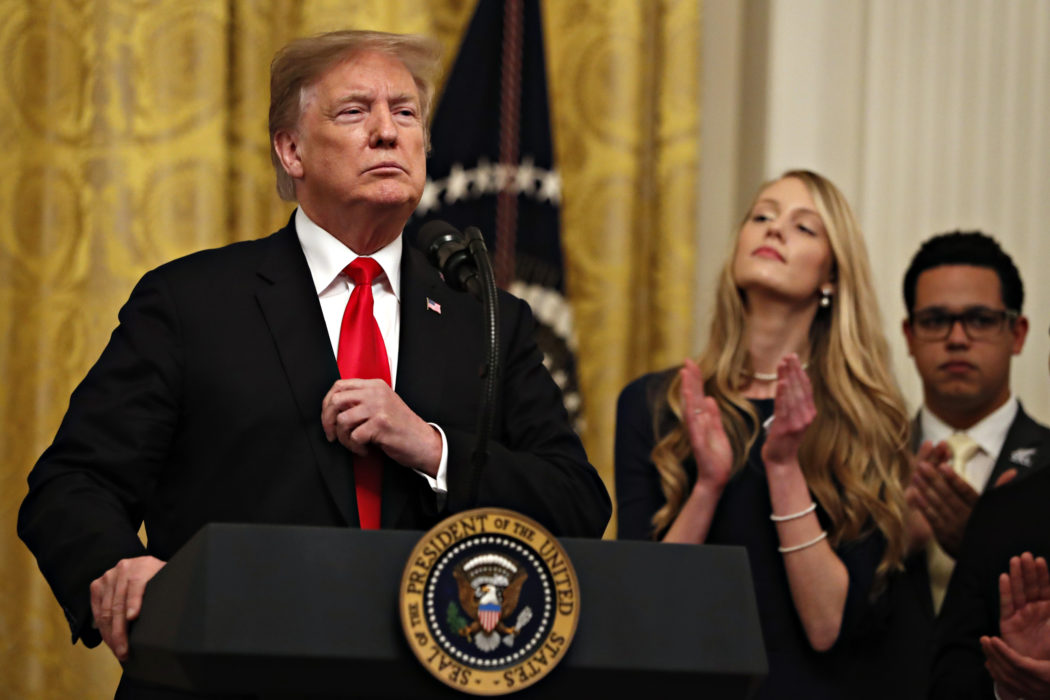COLUMN: Trump’s executive order on free speech is a good idea
Editor’s Note: To submit a response to this column, or submit a letter to the editor on a new topic, email your submission to opinion@usustatesman.com.
During a press conference on March 21, President Trump announced that he was going to sign an executive order protecting freedom of speech on college campuses. In addition, the president said that federal funding would become dependent on following those laws.
Soon after the announcement came, battle lines were drawn either in opposition or appreciation of the president’s proposal.
To many on the right, the legislation comes at the height of a cultural battle on college campuses.
An article from the Hill demonstrates this thought process: “While liberal values and principles remain fundamental, the implications of these precepts necessarily evolve from generation to generation, reflecting social changes and new norms. No cohort has the power to freeze the interpretation of values such as liberalism, academic freedom, or even free expression, and new ways of thinking deserve to be understood and considered, rather than dismissed.”
To some on the left of the political spectrum however, the executive order seems redundant and, in some cases, overreaching.
“Trump’s executive order would create new, bloated bureaucracies in government agencies and on college campuses,” said Emily Chamlee-Wright, an educator at George Mason University, in a March issue of the New York Times.
The executive order is ultimately a good idea, though, because it not only protects minority opinions but also the opinions of the majority who self-censor out of fear of being ridiculed or intimidated.
The protection of free speech is not just an issue at the federal level. During the recent session of the Utah legislature, Rep. Kim Coleman, R-West Jordan, sponsored a bill to protect freedom of speech on Utah college campuses. The bill sought to protect any form of speech that wasn’t already explicitly defined as harassment by the Supreme Court, but the bill eventually failed in the senate.
This brings up a puzzling sentiment. There was a time, not too long ago, when college campuses were seen as vessels of free speech. Students who held unconventional views could feel free to express anti-war, anti-capitalism or pro-feminist views on campuses without the threat of intimidation or retaliation.
In general, college has been marketed as a place where students go to be challenged, learn new ideas and generally feel uncomfortable about some of the things they hear. This is a good thing — it builds students up to work in the adult world.
However, what we now see are speakers being banned from campuses (or if not banned, violent protests overtaking their events), free speech zones being abused and students being punished for trying to distribute or advertise certain political ideologies on campus.
Given the reality college campuses now face, it is incumbent on the president to defend the rights of students to freely express themselves. Especially considering that a state campus is a federal institution that is required to abide by federal laws.
It is mandated in the Constitution of the United States that federal entities not infringe on an individual’s right to free speech. In addition, the Supreme Court has already clearly defined the few forms of speech that are unacceptable, including “fighting words” and certain types of pornography.
So then comes the question: we already have free speech, so what’s the point? If you really believe your campus already follows free speech laws effectively, then this legislation shouldn’t be a problem for you.
If you believe that the legislation is overreaching and could create bloated bureaucracies, then I think a better question is, what are you doing to protect the freedoms of the students on your campus regardless of their political ideology or viewpoint?
Freedom of speech is a Constitutional right, freedom from discomfort is not.
As a result, if it takes more bureaucracy to ensure that certain rights are being protected, then that is the job of the President of the United States.
There are implications for the next generation too. America is currently at a point where politics are bitter and divisive. Political ideologies have caused huge rifts in the fabric of society. There are a lot of reasons for this, but the one we can immediately fix is being open to all sides of political conversation.
It is time to bring college campuses back to their glory days when saying unconventional things was seen as a virtue. It is time to start being respectful to opposing viewpoints and it is time to curb the violence.
Taylor Cripe is a junior at USU double majoring in Constitutional Law and Journalism. She has worked with several conservative groups on campus and loves writing other people’s stories.

